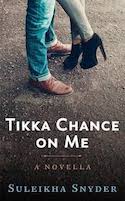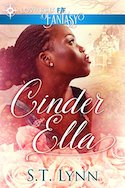Kissing Books: Something out of the ordinary
Every month, Olivia Waite pulls back the covers, revealing the very best in new, and classic, romance. We're extending a hand to you. Won't you take it? And if you're still not sated, there's always the archives.
Holidays are points on the timeline where the ordinary world cracks open a little and something numinous filters through. In the Catholic calendar I was raised with the weeks leading up to Christmas are called Advent, which (like Lent in the spring) is officially, theologically different from the long stretch of green-robed months labeled Ordinary Time. Holidays were by definition extraordinary times.
Some holidays we fixate on more than others, as a culture. Some of those timeline cracks we take a narrative crowbar to, prying the opening wide to get more of the magic out. Christmas, for example, is always being worked at, even in tales that never breathe the name Jesus. There’s a kind of secular magic that turns up, though centering it on a Christian holiday still puts a great deal of pressure on people of other faiths. I think it’s telling that we classify Christmas stories as general fiction, even though they often feature clearly speculative elements. Mortals encounter ghosts or angels or spirits; magical objects change the course of a character’s life; supernatural agents work secretly for the betterment of all. A Christmas Carol is a time-travel book and a ghost story, though people look at you funny if you recommend it as such.
This year, heading into the darkest months, it feels like we need that magic more than usual. We need the oil to last longer than it‘s supposed to; we need ghosts to take gloomy mercy on our errors; we need a kindly supernatural hand to guide us toward a better, happier future. Maybe it’s that vast yearning that cracks open the world in the first place — you can’t make changes without first desiring change. And stories are how we come to understand what we want to be different. So many of those magical stories always seem to come back to very real, very human goodness: generosity, kindness, charity, hope, and love. It has to be more than coincidence.
There’s a scene in A Christmas Carol that almost never makes it into the adaptations: Marley, after confronting Scrooge, directs him to look out the window, where the London streets are teeming with guilty ghosts burdened by chains of greed and selfishness. They wail and weep among the homeless and hungry, and Dickens makes it clear: “The misery with them all was, clearly, that they sought to interfere, for good, in human matters, and had lost the power for ever.” The wish-fulfillment angle of this scene is not ghosts are real. It’s not even you can save yourself, chosen human. The wish-fulfillment is people can help one another in the real world.
Romance author Mary Buckell once said "if you’re writing literary fiction, you believe that people cannot change." Commercial fiction means you believe that people can change.” Half the time I believe this sentiment; half the time I want to challenge it to rapiers at dawn. But I do believe that a happy ending requires transformation. And transformations are hard. We humans are prone to entropy and sluggishness. We want to keep our compass steady, we want to stay where we’re comfortable, we want tomorrow to be predictable because then we know what to expect. We know, deep down, that to make a lasting change to habit or habitat requires more than the usual amount of motivation.
It requires, in fact, a little magic. Something out of the ordinary — an angel, a ghost, a magical Advent calendar in a TV movie. Something to help us do what we fear we’d never succeed at on our own. So we pick a date and pick up the crowbar — or a holiday story — and work to let a little more light shine through.
Recent Romances:

Thankful by Edie Bryant (contemporary f/bi f):
I must be honest: this book leaned a little too heavily on the misunderstandings for my taste. Don’t be an idiot! I was forced to yell silently, at more than one plot point. But allowances must be made for youth, and sometimes the perspective of thirty-seven years only weighs me down like the wettest of blankets. This book is the quintessential New Adult romance, which often feels as if the author and not only the characters are trying to find their voice. It is over-dramatic and prone to impulsive mistakes but also chock-full of what we Olds call potential — I have the oddest feeling that if I just leave this book alone to make its own choices it will grow up into something truly special.
It can’t. Because it’s a book, not a person. But I kind of wish it could.
Maybe it’s just the premise, which is so perfectly suited to my taste that it dwarfed every other objection. Heroine Danielle has had a strained relationship with her parents since leaving home (and coming out), so this year she decides to surprise them by showing up again on their doorstep in her hometown. Only they’ve moved. Out of state. Two years ago. Without telling her. And they wouldn’t have wanted her anyway, because their new condo is a bit too small for guests. It’s the absolute last straw in a long line of parental disinterest, and honestly when Danielle sat down to have a good cry on the porch it seemed like the most human thing she could have done.
But she isn’t crying long, because her former best friend Elise — who lives just across the street, with a houseful of happy extended family — finds her and demands she stay with them for the long holiday weekend. Danielle is nervous, because she always had a hopeless crush on her straight friend. Elise is nervous, because in the years since they drifted apart she’s come out as bisexual, but she’s never found anyone else who she loves as much as she loved Danielle. I’d have liked to have seen a few more scenes of our heroines interacting without the drama — the focused nature of novellas mean we’re in crisis mode most of the time, when I wanted to know how they would treat one another in, as it were, ordinary time. Holidays and family crises are states of heightened reality, which don’t always reflect someone’s daily state of being. But, on the whole, this sweet and earnest little f/f is doing okay, even if it hasn’t mastered adulting quite yet.
I’d met some great people with great qualities who, theoretically, I should have really been into. But I never was. There was never that chemistry that I desperately desired. I wanted to be with someone I loved. I wanted to be thrilled to wake up to someone in the morning and go to bed with them at night. I wanted happiness like I’d never felt it before.

A Wedding One Christmas by Therese Beharrie Carina Press: contemporary m/f):
This South African-set book is an absolute confection, but there’s a surprisingly rich and satisfying center beneath all the froth and frosting on top. Beharrie begins with a classic romance set-up: two strangers meet by chance at a wedding they have complicated feelings about. Angie is a romance writer still working through her grief about her father’s death years ago (just @ me next time, why don’t you) and Ezra is a newly heartbroken women’s studies professor (who never mansplains feminism to the heroine, thankfully) struggling to get perspective on the mistakes of relationships past. They are two people running headlong from their own pain and vulnerabilities, all of which get knotted up when they crash into one another. Like Christmas lights in a box in the garage. By the time they untangle all the separate strings, they’ve had time to start to heal and get their souls in order. And also experience the sheer, breathtaking horror conjured up by the phrase volunteer ad-libbed Nativity play.
Reader, it was appalling and hilarious and absolutely delicious.
Therese Beharrie’s buoyant voice moves like quicksilver, trading flirty banter for sharp, painful flashes of realization in an instant. It keeps the reader feeling comfortingly weightless even as she lands on truly profound questions: where is the line between independence and loneliness? Between wants and needs? How do you give yourself up to passion and generosity without sacrificing too much or leaving yourself hollow and empty? These are not problems quickly solved, as the book well knows. The story takes place in a single day but gives our hero and heroine plenty of scope for chemistry, for confrontation, and for communication. Like a stage play — or a ghostly holiday tale — where the emotional ground covered is far more extensive than the chronological space would appear to allow. Sure, it’s been one day in book time — but we’ve been there with these two for all of it. We know who they are by now, so it’s natural to believe they know each other well enough to fall a little bit in love. Sweet but not saccharine, heavy on the romance but super-light on the sex, this is one thoughtful holiday romance you won’t want to miss.
The real problem was that he wanted her. It was that plain, that simple. It had nothing to do with him going home. Or with what he’d face at home. It had everything to do with the falling. That after a day in her presence, he knew he was falling, and could only imagine what another day — a week, a month, a year — would do. He didn’t want to have to imagine. He wanted to live it. He didn’t want to say goodbye.

Tikka Chance on Me by Suleikha Snyder (self-published: contemporary m/f):
The power of the good girl/bad boy trope is this: the good girls are never as good as people think, and the bad boys are always secretly better than anyone gives them credit for. It’s about truth versus reputation; rumors, secrets, and hidden hopes all balled up together and heated up by conflict and chemistry.
That’s never been truer than in this sleek and perfect novella from Suleikha Snyder. Pinky Grover dropped out of grad school to help out when her mom got sick, and now slings plates in her family’s Indian restaurant, as though she never dreamed of traveling the world and studying unique cultures. Trucker Carlson was a fuck-up as a kid and now does worse as a member of the Eagles biker gang — a violent, gun-running, white supremacist outfit — but despite his poor taste in friends, Trucker can’t stay away from Mrs. Grover’s amazing samosas. Or from the daughter who serves them up. The two have no business hooking up, none at all. But months of silent eye-banging and one cheesy pickup line in a Walmart parking lot are all it takes to turn sparks into supernovas — and lord, did this book knock me down. Snyder has a way of taking two characters who are plenty interesting on their own, and making them sparkle even more brilliantly as a couple. Her sex scenes just feel like so much fun: banter and teasing and laughter, along with feelings and revelations and high-quality orgasms. It makes the breakneck pace of the romance completely plausible. “We can’t be in love this quickly,” the characters say, and the reader cries back that of course you can! Look at how good you are together!
It’s a roller coaster, with all the stomach drops and rushing adrenaline. We fall fast and hard and I for one wouldn’t have it any other way.
He wore his Eagles leathers — there was probably some kind of rule that he couldn’t take them off — but the faded T-shirt that hugged his chest sported Captain America’s shield. It seemed a little off-brand, given his choice of vocation and the company he kept.

Cinder Ella by S.T. Lynn (LoveLight Press: trans f/f):
Cinderella variants are my absolute catnip in romance — historical, fantasy, or contemporary, I like the classic shape as much as I like the twists, and I never seem to get tired of them no matter how many I read. The heart of the story is not about the prince, or not simply about the prince: it’s about a true and hopeful soul finding recognition of worth after having persevered through trials and suffering, and in spite of poverty and powerlessness. How could such a dream ever get old?
S.T. Lynn’s variant gives us a black trans heroine, making the question of recognition all the more vital. Ella has lost her mother and her father, and her social climbing stepmother insists on referring to her as Cole, her late father’s son, so Ella has to keep her true self carefully hidden unless she’s alone. Despite all the grief and heartache in her life, though, Ella is still a dreamer, still determined to find good where she can (the days she tends the gardens, pamphlets of designer dresses, her dog Lady). When she is invited to attend the ball and dance with the princess, it’s more than she ever dared hope for. This is a wide-open wish-fulfillment story, not subtle in the least and very YA-inflected, but Ella is so warmly charming that you stay with her even though you can see the strings moving, narratively speaking. The secondary characters are equally lovely, from the mischievous lady-in-waiting in love with the prince, to the small-town cheese maker and goatherd who helps Ella get back on her feet in the second act. It gave me serious nostalgia for all the semi-modern fairy-tale retellings I loved best growing up: Patricia Wrede’s Enchanted Forest Chronicles, M. M. Kaye’s The Ordinary Princess, the gorgeous film adaptation of Rogers and Hammerstein’s Cinderella starring Brandy as the lead. Sometimes you need to watch nice things happen to nice people, in spite of all the villains in the world.
Ella wasn’t sure if a woman could fall in love talking over dogs and gardening, two songs and a single kiss, but her heart was giving it a good try.
This Month’s Cult Classic

A Christmas Gone Perfectly Wrong by Cecilia Grant (self-published: historical m/f):
I love the Blackshear trilogy but until recently had let prequel novella A Christmas Gone Perfectly Wrong slip through the cracks. Turns out it’s my absolute favorite kind of Christmas story: a lonely, lovely misadventure with unexpected snow, stern souls learning to unbend, and finding warmth in places you least expect it. Eldest Blackshear sibling and general stick-in-the-mud Andrew has ventured out to the country to purchase a falcon for his soon-to-be-married sister. The falcons are trained by Baron Sharp and his daughter Lucy, who’s led a lonely if brilliantly educated life with her father for company — reading Hume, having philosophical debates, and training birds. Andrew puts the demands of family and duty above all else. Lucy yearns to know more of the world, but her father is set in his ways and doesn’t budge from his comfortable home. She has a chance to attend her first Christmas party in society, with people her own age and potential husbands — but to get there, she has to convince prim and prudish Andrew to throw propriety to the wind and drive her to her aunt’s house unchaperoned. It should be a short and simple trip, after which they will part as strangers forever.
Of course it all goes, as the title says, perfectly wrong.
There are more than a few romance authors whose status in the genre is partly due to sheer accumulation. Nora Roberts has written over two hundred titles and counting. The Romance Writers of America give their Centennial Award to members who’ve published one hundred books, and the list of names is both illustrious (shoutout to Brenda Jackson and Jayne Ann Krentz/Amanda Quick!) and surprisingly lengthy.
And then there’s Cecilia Grant.
There’s a much-mangled quote about the Velvet Underground: that they didn’t sell many records, but that every single person who bought one went out and started a band. Since her debut in 2012 Cecilia Grant has published three novels and a holiday novella — certainly not nothing, but quantifiably on the low end by romance’s ravenous standards. Yet those four stories inevitably crop up on best-of lists, in Twitter recommendation threads, and in conversations at conventions and Instagram feeds. People will occasionally ask each other if she’s still writing — because even nearly five years after her final novella appeared, they’re still hungry for more of her stories, more of her characters. She’s one of the rare authors who works both for longtime romance readers and for people brand new to the genre. If there is such a thing as a romance cult author, Cecilia Grant is it.
Trouble found him, in torrents that put the winter squall to shame.